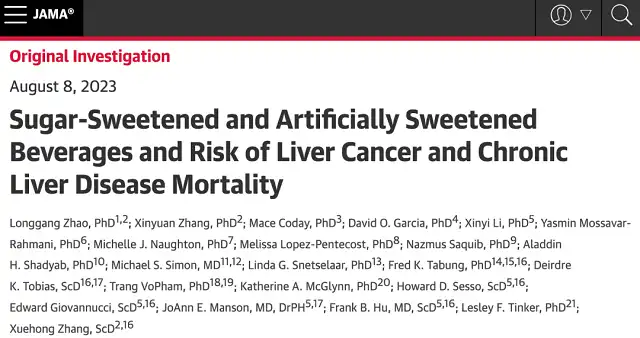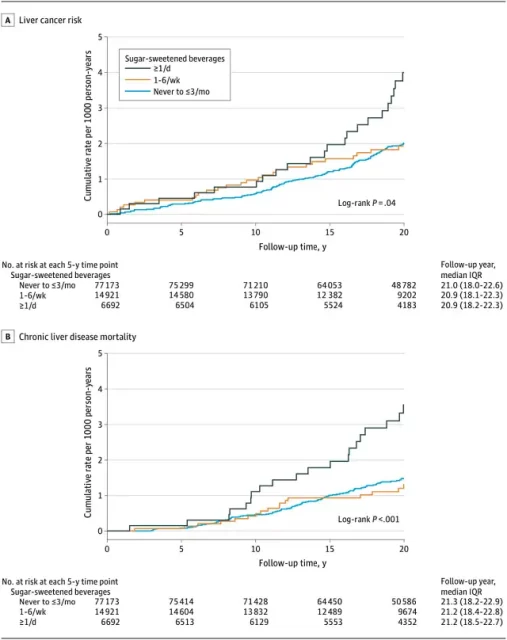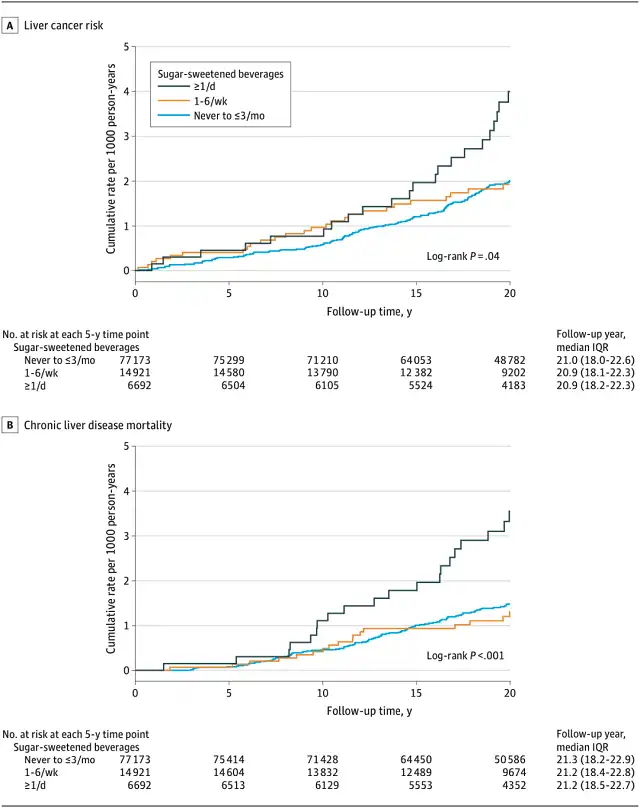Sugary Drinks linked with Liver Cancer in Postmenopausal Women
- Normal Liver Cells Found to Promote Cancer Metastasis to the Liver
- Nearly 80% Complete Remission: Breakthrough in ADC Anti-Tumor Treatment
- Vaccination Against Common Diseases May Prevent Dementia!
- New Alzheimer’s Disease (AD) Diagnosis and Staging Criteria
- Breakthrough in Alzheimer’s Disease: New Nasal Spray Halts Cognitive Decline by Targeting Toxic Protein
- Can the Tap Water at the Paris Olympics be Drunk Directly?
Sugary Drinks linked with Liver Cancer in Postmenopausal Women
- Should China be held legally responsible for the US’s $18 trillion COVID losses?
- CT Radiation Exposure Linked to Blood Cancer in Children and Adolescents
- FDA has mandated a top-level black box warning for all marketed CAR-T therapies
- Can people with high blood pressure eat peanuts?
- What is the difference between dopamine and dobutamine?
- How long can the patient live after heart stent surgery?
Sugary Drinks linked with Liver Cancer in Postmenopausal Women.
JAMA: Harvard Scientists Confirm for the First Time a Link Between Consuming 1 Sugary Drink Daily and 85% Increased Risk of Liver Cancer, 68% Increased Risk of Death from Chronic Liver Disease in Postmenopausal Women.
Recently, a significant research finding by researchers from Harvard Medical School was published in the prestigious medical journal JAMA.

This research involved a longitudinal study spanning 21 years, focusing on nearly 100,000 postmenopausal women aged 50 to 79.
The study compared the effects of consuming 1 or more servings of sugary drinks per day with those who consumed 3 servings (355 milliliters per serving) or fewer per month.
The sugary drinks included regular soft drinks and fruit beverages, excluding fruit juices.
The results showed that postmenopausal women who consumed 1 or more servings of sugary drinks daily had an 85% increased risk of developing liver cancer and a 68% increased risk of death due to chronic liver disease, when compared to those who consumed 3 servings or fewer per month.
The impact of Dr. Zhang’s research left many concerned. However, for those who realized the study’s age relevance to them was still decades away, a sense of relief set in, although concerns about their mothers’ health were triggered.
This study marks the first scientific confirmation of the correlation between sugary beverage consumption and death related to chronic liver disease.
While research investigating the link between sugary drinks and cancer is plentiful, studies specifically exploring the connection between sugary drinks and liver cancer or death from chronic liver disease have been sparse and limited in scope.
Some studies highlighted a correlation between sugary drinks and liver cancer, but didn’t report the incidence of liver cancer. Others didn’t explore the link with death from chronic liver disease at all.
To bridge this gap, Dr. Zhang’s team utilized data from the Women’s Health Initiative (WHI) cohort.
The WHI cohort, established between 1993 and 1998 by 40 clinical centers in the US, comprised 161,808 postmenopausal women aged 50 to 79. This cohort was followed until March 1, 2020.
From the WHI cohort, the researchers included data from 122,970 participants, with 98,786 having consumed sugary drinks and 64,787 having consumed artificially sweetened beverages, based on inclusion criteria.

The analysis of the sugary drink consumers revealed that among 98,786 individuals, 77,173 consumed ≤3 servings per month, 14,921 consumed 1-6 servings per week, and 6,692 (6.8%) consumed ≥1 serving per day. During a median follow-up of 20.9 years, this group experienced 207 new liver cancer diagnoses and 148 deaths due to chronic liver disease, which included non-alcoholic fatty liver disease, liver fibrosis, liver cirrhosis, alcoholic liver disease, and chronic hepatitis.
In essence, women who consumed 1 or more servings of sugary drinks daily exhibited a liver cancer incidence rate of 18 cases per 100,000 person-years and a chronic liver disease death rate of 17.7 cases per 100,000 person-years.
In contrast, women who consumed 3 or fewer servings per month had a liver cancer incidence rate of 10.3 cases per 100,000 person-years (adjusted hazard ratio [HR], 1.85; P=0.01) and a chronic liver disease death rate of 7.1 cases per 100,000 person-years (adjusted HR, 1.68; P=0.04).
In simple terms, consuming 1 or more servings of sugary drinks daily was associated with an 85% increased risk of liver cancer and a 68% increased risk of death from chronic liver disease.

Relationship between drinking sugary drinks and liver cancer (A) and death from chronic liver disease (B)
Interestingly, this study found no significant correlation between higher consumption of artificially sweetened beverages and increased risk of liver cancer or death from chronic liver disease.
This aligns with recent evaluations by organizations like the International Agency for Research on Cancer (IARC), which categorized aspartame, a common artificial sweetener, as “possibly carcinogenic to humans” (IARC Group 2B), due to limited evidence regarding its link to human cancer, particularly liver cell carcinoma.
Additionally, the research team analyzed the relationship between sugary and artificially sweetened beverages and the high-risk factors of HBV or HCV infections.
They found no significant correlation, indicating that the increased risk of liver cancer associated with sugary drink consumption is unrelated to these infections.
In conclusion, within the demographic of postmenopausal women, those who consumed 1 or more servings of sugary drinks daily faced a higher probability of developing liver cancer and dying from chronic liver disease when compared to those consuming 3 or fewer servings per month.
However, the biological mechanisms underlying these associations necessitate further foundational research.
It’s important to note that although this study didn’t find a link between higher consumption of artificially sweetened beverages and increased risk of liver cancer or death from chronic liver disease, this shouldn’t be interpreted as an endorsement for unrestricted consumption of these beverages.
Recent studies have associated high intake of artificial sweeteners with an increased risk of cardiovascular diseases and type 2 diabetes.
In the pursuit of health, it’s prudent for everyone to limit their intake of both sugar and artificial sweeteners.
References:
[1] Zhao L, Zhang X, Coday M, et al. Sugar-Sweetened and Artificially Sweetened Beverages and Risk of Liver Cancer and Chronic Liver Disease Mortality. JAMA. 2023;330(6):537-546. doi:10.1001/jama.2023.12618
[2] Stepien M, Duarte-Salles T, Fedirko V, et al. Consumption of soft drinks and juices and risk of liver and biliary tract cancers in a European cohort. Eur J Nutr. 2016;55(1):7-20. doi:10.1007/s00394-014-0818-5
[3] Jones GS, Graubard BI, Ramirez Y, et al. Sweetened beverage consumption and risk of liver cancer by diabetes status: A pooled analysis. Cancer Epidemiol. 2022;79:102201. doi:10.1016/j.canep.2022.102201
[4] https://www.who.int/news/item/14-07-2023-aspartame-hazard-and-risk-assessment-results-released
[5] Debras C, Chazelas E, Sellem L, et al. Artificial sweeteners and risk of cardiovascular diseases: results from the prospective NutriNet-Santé cohort. BMJ. 2022;378:e071204. Published 2022 Sep 7. doi:10.1136/bmj-2022-071204
[6] Debras C, Deschasaux-Tanguy M, Chazelas E, et al. Artificial Sweeteners and Risk of Type 2 Diabetes in the Prospective NutriNet-Santé Cohort [published online ahead of print, 2023 Jul 25]. Diabetes Care. 2023;dc230206. doi:10.2337/dc23-0206
(source:internet, reference only)
Disclaimer of medicaltrend.org
Important Note: The information provided is for informational purposes only and should not be considered as medical advice.



